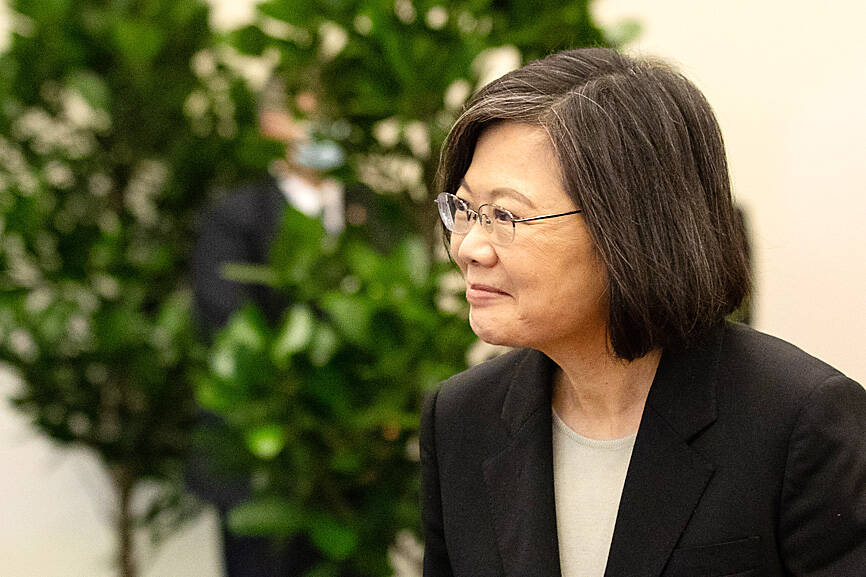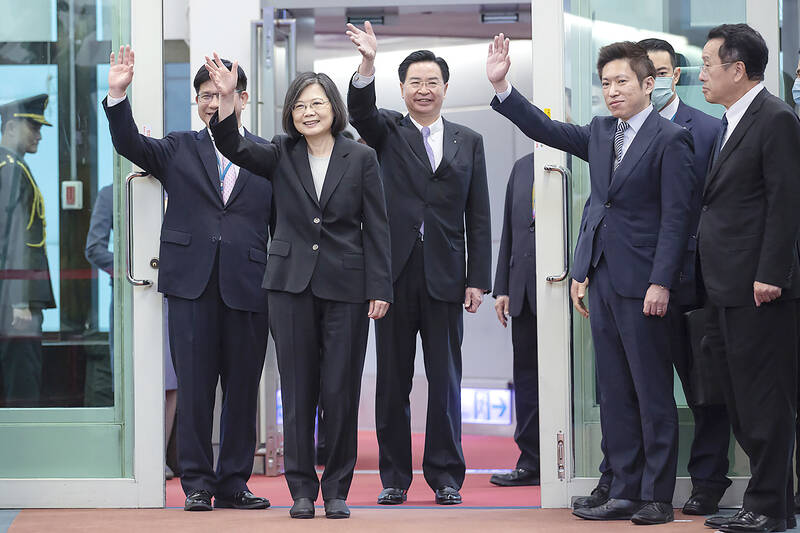President Tsai Ing-wen (蔡英文) yesterday afternoon left Taiwan on a 10-day trip to Central America that includes stopovers in New York and Los Angeles.
“Through this visit, I will express my gratitude to diplomatic partners for their support of Taiwan,” Tsai said at Taiwan Taoyuan International Airport shortly before boarding the plane.
The trip to Guatemala and Belize — her first overseas journey since the COVID-19 pandemic began sweeping around the world in early 2020 — aims to “demonstrate Taiwan’s determination to deepen exchanges” with its Central American allies, she said.

Photo: RITCHIE B. TONGO, EPA-EFE
Tsai said that she and her delegation would also explore the possibility of expanding cooperation with Taiwan’s allies and partners in the areas of agriculture, public health, women’s empowerment, the digital economy and supply chain security.
As Taiwan plays “an indispensable role” in the restructuring of global supply chains, it must work with other countries and contribute to the economic recovery in the post-COVID-19 era, she added.
The presidential delegation would stop over in New York en route to Guatemala and Los Angeles after visiting Belize, the Ministry of Foreign Affairs said.

Photo: Taiwan Presidential Office via AP
Tsai is to arrive in New York at 3am today and spend nearly two days in the city, where she is expected to address an event hosted by the Hudson Institute and receive a “global leadership award” from the think tank.
On her return trip, Tsai is to touch down on Wednesday next week in Los Angeles, where she is expected to meet with US House of Representatives Speaker Kevin McCarthy and deliver a speech at the Ronald Reagan Presidential Library.
The president would be in Guatemala from Saturday to Monday and Belize from Monday to Wednesday, the ministry said.
She is to meet with Guatemalan President Alejandro Giammattei and Belizean Prime Minister John Briceno, as well as Taiwan’s technical missions and expatriates in both countries.
Tsai is to land in Taiwan on Friday next week, although the ministry has not yet announced her arrival time.
Despite a lack of diplomatic relations between Taiwan and the US, Washington has over the years allowed Taiwan’s presidents to make stopovers on US soil during their trips to Latin American and Caribbean nations.
US Department of State spokesperson Vedant Patel said earlier this week that Tsai’s transits in the US are “consistent with longstanding US practice, the unofficial nature of our relations with Taiwan and US policy, which remains unchanged.”
However, China’s Taiwan Affairs Office spokesperson Zhu Fenglian (朱鳳蓮) yesterday told a news briefing in Beijing that Tsai’s stopovers in the US constitute an act of “provocation.”
Beijing would “resolutely fight back” with certain measures should Tsai and McCarthy meet, Zhu said.
The delegation traveling with Tsai consists of Presidential Office Secretary-General Lin Chia-lung (林佳龍), Minister of Foreign Affairs Joseph Wu (吳釗燮) and Deputy Minister of Economic Affairs Chen Chern-chyi (陳正祺), among other officials.
The delegation also includes four legislators: Chen Ou-po (陳歐珀) and Chen Ming-wen (陳明文) of the Democratic Progressive Party, Chiu Chen-yuan (邱臣遠) of the Taiwan People’s Party and Claire Wang (王婉諭) of the New Power Party.

CHAOS: Iranians took to the streets playing celebratory music after reports of Khamenei’s death on Saturday, while mourners also gathered in Tehran yesterday Iranian Supreme Leader Ayatollah Ali Khamenei was killed in a major attack on Iran launched by Israel and the US, throwing the future of the Islamic republic into doubt and raising the risk of regional instability. Iranian state television and the state-run IRNA news agency announced the 86-year-old’s death early yesterday. US President Donald Trump said it gave Iranians their “greatest chance” to “take back” their country. The announcements came after a joint US and Israeli aerial bombardment that targeted Iranian military and governmental sites. Trump said the “heavy and pinpoint bombing” would continue through the week or as long

TRUST: The KMT said it respected the US’ timing and considerations, and hoped it would continue to honor its commitments to helping Taiwan bolster its defenses and deterrence US President Donald Trump is delaying a multibillion-dollar arms sale to Taiwan to ensure his visit to Beijing is successful, a New York Times report said. The weapons sales package has stalled in the US Department of State, the report said, citing US officials it did not identify. The White House has told agencies not to push forward ahead of Trump’s meeting with Chinese President Xi Jinping (習近平), it said. The two last month held a phone call to discuss trade and geopolitical flashpoints ahead of the summit. Xi raised the Taiwan issue and urged the US to handle arms sales to

A magnitude 5.6 earthquake struck off the coast of Yilan County at 12:37pm today, with clear shaking felt across much of northern Taiwan. There were no immediate reports of damage. The epicenter of the quake was 16.9km east-southeast of Yilan County Hall offshore at a depth of 66.8km, Central Weather Administration (CWA) data showed. The maximum intensity registered at a 4 in Yilan County’s Nanao Township (南澳) on Taiwan’s seven-tier scale. Other parts of Yilan, as well as certain areas of Hualien County, Taipei, New Taipei City, Taoyuan, Hsinchu County, Taichung and Miaoli County, recorded intensities of 3. Residents of Yilan County and Taipei received

Taiwan has secured another breakthrough in fruit exports, with jujubes, dragon fruit and lychees approved for shipment to the EU, the Ministry of Agriculture said yesterday. The Animal and Plant Health Inspection Agency on Thursday received formal notification of the approval from the EU, the ministry said, adding that the decision was expected to expand Taiwanese fruit producers’ access to high-end European markets. Taiwan exported 126 tonnes of lychees last year, valued at US$1.48 million, with Japan accounting for 102 tonnes. Other export destinations included New Zealand, Hong Kong, the US and Australia, ministry data showed. Jujube exports totaled 103 tonnes, valued at